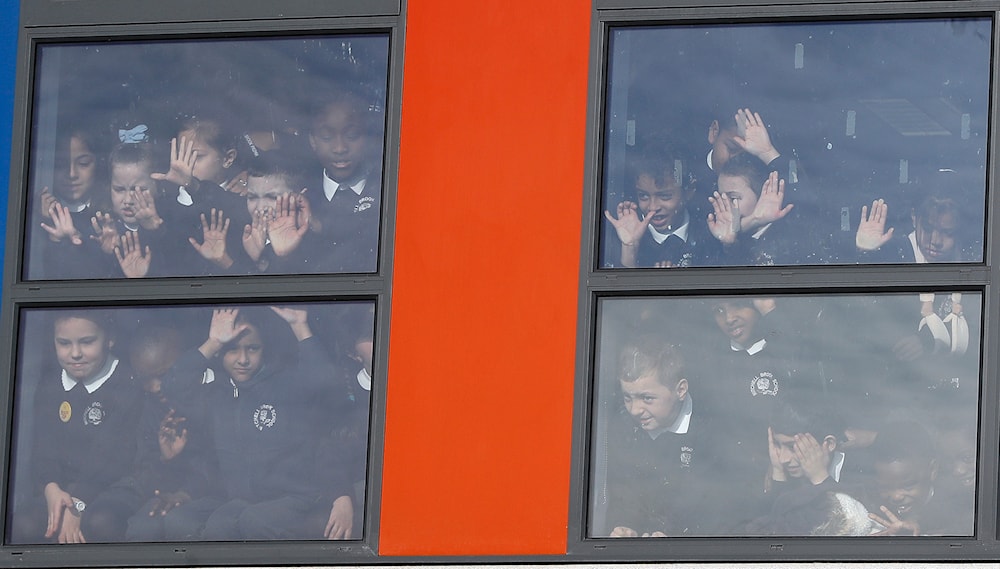Teachers warn of rising misogyny in UK schools
UK teachers report increasing misogynistic and racist behaviour in schools, linked to the influence of Andrew Tate, Donald Trump, and harmful social media content.
-
 Schoolchildren look out of windows at Mitchell Brook Primary School in London, on Monday, February 6, 2017. (AP)
Schoolchildren look out of windows at Mitchell Brook Primary School in London, on Monday, February 6, 2017. (AP)
UK teachers are raising serious concerns over a rise in misogynistic and racist behaviour among students, citing the influence of controversial figures such as Andrew Tate and Donald Trump. A new survey conducted by the NASUWT teaching union attributes the trend primarily to social media, with many educators, particularly women, reporting increased hostility and defiance in the classroom.
Findings presented at the NASUWT’s annual conference highlight troubling conduct among pupils, including sexist remarks, disrespect toward female staff, and open displays of racism. One teacher shared, “A lot of the students are influenced by Tate and Trump, they spout racist, homophobic, transphobic and sexist comments in every conversation and don’t believe there will be consequences.”
Social media and the influence of Tate and Trump
According to the union, two-thirds of surveyed teachers identified social media as a primary factor in deteriorating student behaviour. Patrick Roach, NASUWT general secretary, stated, “Pupils believe it is their inalienable right to access their mobile phones throughout the school day – and use them to interrupt lessons, bully others, act out, or to garner respect from their peers.”
Educators pointed to the Andrew Tate influence as particularly damaging. Some students, notably young boys, are emulating his misogynistic content. One primary school teacher reported that 10-year-old boys refused to speak with her, instead choosing to engage only with male staff. “They follow Andrew Tate and think he is amazing with all his cars and women and how women should be treated,” she said.
Impact on female teachers and school authority
Multiple teachers described incidents where boys mimicked behaviours seen in Tate’s videos, including barking at female staff or physically blocking their way. These actions reflect broader concerns about eroding respect for authority, especially for women in educational roles.
Beyond overt sexism and racism in UK education, educators reported that students are being exposed to violent, explicit online material and are increasingly resistant to guidance. One teacher explained, “They read lots of fake news and sensationalised stories that make them feel empowered and that they know better than the teacher.”
Teachers call for stronger policies
While Roach acknowledged recent talks with government officials, he emphasized the need for more comprehensive solutions. “We now need a plan to tackle what has become a national emergency,” he urged, arguing that limiting mobile phone use alone will not address the root causes.
A Department for Education spokesperson responded, “We know the rise of dangerous influencers is having a damaging impact on our children,” and referenced upcoming curriculum reforms and online protections under the Online Safety Act.
Teachers also reported growing hostility from parents, some of whom react aggressively when asked to address their child’s behaviour. Lindsay Hanger, a teacher from Norwich, said schools often feel pressured to tolerate misconduct to avoid suspensions and maintain attendance rates. “I think the government needs to go further,” she said, advocating for parental accountability in supporting behaviour strategies.
The conference also passed a motion opposing “no exclusion” policies, arguing that efforts to reduce suspensions are undermining discipline. Roach reiterated the union’s demand for a fully funded, real-terms pay rise for teachers, warning, “Anything less will be met with the response from our members it deserves.” He confirmed that NASUWT will proceed with a formal strike ballot if the government fails to meet pay review expectations.

 4 Min Read
4 Min Read










